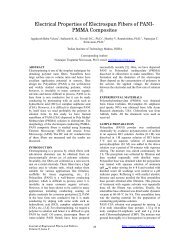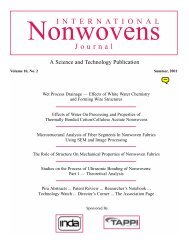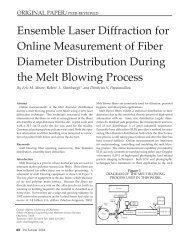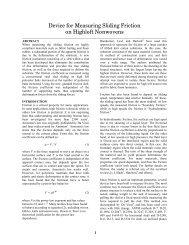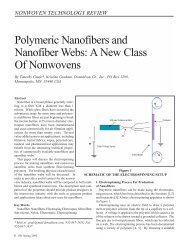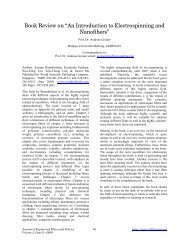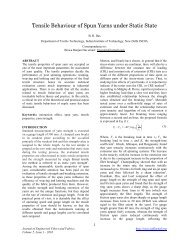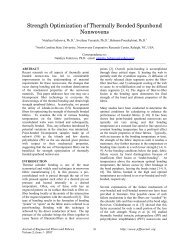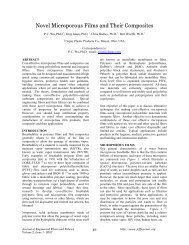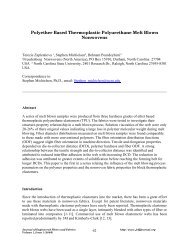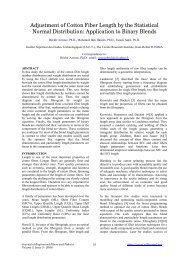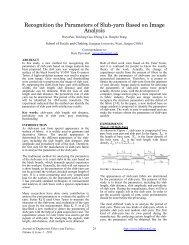1999 - Volume 2 - Journal of Engineered Fibers and Fabrics
1999 - Volume 2 - Journal of Engineered Fibers and Fabrics
1999 - Volume 2 - Journal of Engineered Fibers and Fabrics
You also want an ePaper? Increase the reach of your titles
YUMPU automatically turns print PDFs into web optimized ePapers that Google loves.
The Nonwoven Web<br />
Beaucoup beaucoup.com 240.<br />
DejaNews deja.com Primarily for news items; limited for other uses. .<br />
DogPile dogpile.com 2<br />
Meta-search engine, which uses other engines to<br />
do simultaneous searching. .<br />
Euroseek euroseek.net 1,160 Focus on European portion <strong>of</strong> the net. .<br />
Excite excite.com 1,152 An all-purpose engine. .<br />
Google google.com 2,758.<br />
HotBot hotbot.com 1,080<br />
Can use common language; Can specify results<br />
by date, domain, links to an URL. .<br />
InfoSeek infoseek.com 2,073<br />
A hybrid search engine that combines<br />
staff-reviewed sites with search engine results. .<br />
Jeeves ask.com 44<br />
Fair; is a Meta-search engine; in this search it<br />
used Yahoo, Altavista, Webcrawler, Infoseek <strong>and</strong><br />
Excite. .<br />
Lycos lycos.com 6<br />
Netscape netscape.com 9 Web browser.<br />
NonwovensWeb nonwovensweb.com 1,344 Industry specific; building database.<br />
NorthernLight northernlight.com 20,033<br />
Not very discriminating; has a special collection<br />
<strong>of</strong> 2 million articles from many sources. ;<br />
Pr<strong>of</strong>usion pr<strong>of</strong>usion.com 135 Meta-search engine;<br />
CNet cnet.com 1,260<br />
Snap snap.com 1,200<br />
WebCrawler webcrawler.com Meta-crawler.<br />
Yahoo yahoo.com 62 Good for broad topic search<br />
As a practicality, a search engine can shortly become much more expert <strong>and</strong> efficient in searching broad topics<br />
<strong>of</strong> a similar nature. Consequently, some search engines are more useful in dealing with certain topics than with<br />
other topics.<br />
Other search engines are designed to utilize a different search strategy. In some cases the search engine goes<br />
out <strong>and</strong> utilizes the searching capability <strong>of</strong> half a dozen other search engines, bringing back the results <strong>of</strong> their<br />
searching as an answer to the original query. Naturally, the quality <strong>of</strong> such a search is dependent upon the<br />
specific slave search engines employed.<br />
Also, it should be realized that the nature <strong>of</strong> searching on the Internet generally results in a substantial time<br />
delay. When a new website is established, it takes time to be incorporated into the database memories <strong>of</strong> the<br />
popular search engines. It has been estimated that it takes about six months for a new web site to be so<br />
incorporated <strong>and</strong> to be used in subsequent searches. Consequently, newly constructed sites may be ignored for<br />
several months.<br />
All <strong>of</strong> this points out another fact <strong>of</strong> life that should be recognized in organizing a search. This was highlighted<br />
in a recent study published in the scientific journal, Nature (June <strong>1999</strong>). This study revealed that the amount <strong>of</strong><br />
information being indexed by the commonly used search engines is increasing, but it is not increasing as fast<br />
as the amount <strong>of</strong> information being put on the web. Unfortunately, this means that the explosive rate at which<br />
information is being placed on the web may actually result in more information being lost to easy public view<br />
than is made available.<br />
file:///D|/WWW/inda/subscrip/inj99_2/web.html (3 <strong>of</strong> 6) [3/21/2002 5:04:02 PM]




